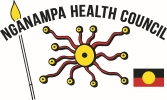Our program aims to both improve health outcomes for Anangu and to improve their access to health care. Over time this should reduce the number of acute presentations, and improve the quality of life of Anangu.
Through funding provided by the Rural Doctors Workforce Agency, we have employed a chronic disease program manager who has overall responsibility for coordinating the program activities. The addition of this position has greatly improved the management of our activities. This is best illustrated by the improvement in the number of completed adult health checks. In 2008/09 only 86 adult health checks were completed. In 2016/17 over 1,400 were completed with comparable increases in the number of patients with a care plan.
Our program provides a standardised and consistent approach to chronic disease management. Tools and systems have been developed that support Aboriginal Health Workers, nurses, doctors and other clinicians in the management of chronic diseases. A range of activities are conducted along the continuum of care for patients considered at risk for chronic disease and for patients with established chronic disease. Our program aims to assist patients manage their health by providing the necessary resources and expertise from health professionals. Elements of our program include the promotion of healthy lifestyles, the early identification of those at risk and the monitoring of those with established disease.
The principles of our chronic disease program are:
- A self-management approach.
- The use of evidence based guidelines.
- Quality clinical backup including documentation, care plans and recall systems.
- A whole of organisation approach that includes strategic partnerships and relationships with specialists including respiratory physicians, dentists, podiatrists, ophthalmologists, optometrists, and diabetes educators.
The basic tools that are used include:
- Adult health checks.
- Care plans.
- Team Care Arrangements.
- Nurse Care Plans.
The benefits of our program include:
- Provision of a primary health care approach.
- Provision of culturally appropriate and context specific tools.
- Encourages early detection, diagnosis and intervention for common and treatable conditions that cause morbidity and early mortality.
- Improves patient rapport with clinic and health staff
- Provides a vehicle to promote and deliver health messages
- Improves patient knowledge and ability to manage their health
- Improved health outcomes in the long term
- Care is planned and coordinated over the year
- To facilitate and coordinate the use of allied health and dental services
- Supports access to timely and proactive health care for all patients in remote communities
- Improves access to specialist services for people living in remote communities
With support from the South Australian Department of Health, we operate a dedicated rheumatic heart disease program. Approximately 40% of all South Australians with rheumatic heart disease or acute rheumatic fever live on the APY Lands. Our program:
- Monitors patients to ensure they are receiving their monthly medication.
- Coordinates visits by a cardiologist.
- Reviews patient notes to identify patients who might have acute rheumatic fever.
Our chronic disease program supports visits by a respiratory physician and by a nephrologist. These visits are funded by the Rural Doctors Workforce Agency.
Through funding from the Country SA Primary Health Network, we operate a Integrated Team Care program. These funds are used to coordinate the care of patients with a chronic condition and can be used to purchase medical equipment for patients with a chronic condition.
Nganampa Health Council gratefully acknowledges the financial and other support from Country SA PHN and the Australian Government Department of Health.



